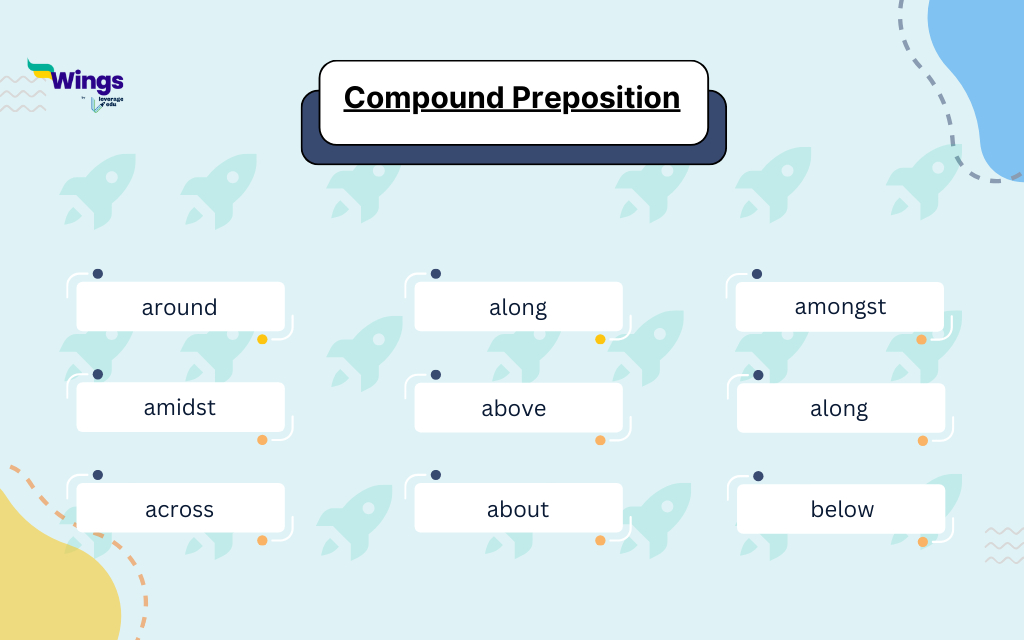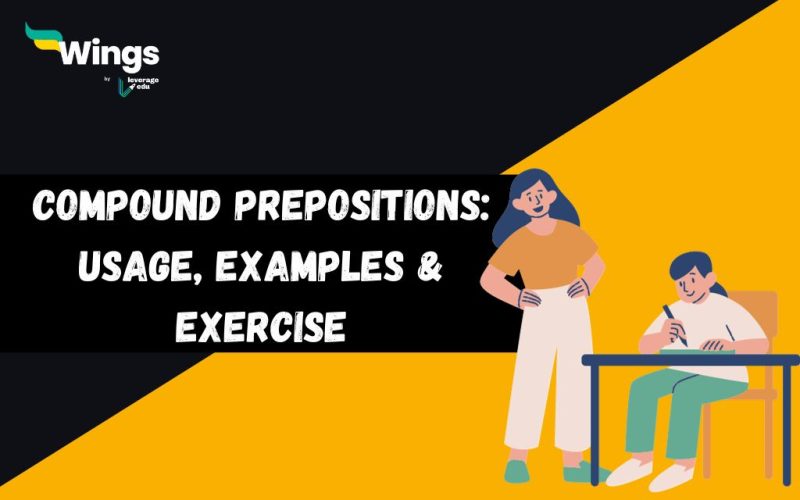Grammar trips students up not because it is hard but because it is explained badly. Compound Prepositions are a perfect example. Students mix them up or break them in sentences that leads to awkward sentences. This blog fixes that. Here, Compound Prepositions are explained in simple English with rules and examples. Nd after this, you will know exactly how Compound Prepositions function and how to use them without second-guessing.
This Blog Includes:
What are Compound Prepositions?
A compound preposition is a group of two or more words that work together as one preposition in a sentence. These words are used before a noun or pronoun to show direction, time, place, reason, or relation.
Unlike simple prepositions such as in, on, or at, compound prepositions are made by joining a simple preposition with another word. This other word can be a noun, adjective, or adverb.
Compound prepositions always act as one single unit. You cannot break them in the middle. They give more clear and specific meaning than simple prepositions.
Examples of compound prepositions include:
- in front of
- because of
- due to
- instead of
- in spite of
Example sentence:
She stood in front of the class and spoke confidently.

Also Read: Rules for Prepositions in English Grammar with Examples
How Are Compound Prepositions Formed?
Compound prepositions are formed by joining two or more words that function together as one preposition in a sentence.
In most cases, a compound preposition follows this pattern:
- The first word is usually an adverb, adjective, or conjunction
- The last word is usually a simple preposition like to, of, in, on, for
Formation of Two-Word Compound Prepositions
Two-word compound prepositions are made by combining:
- an adverb, adjective, or conjunction
- with a simple preposition
Examples:
- according to
- because of
- instead of
- aside from
Example sentences:
According to his teacher, he is a good student.
You should have gone north instead of going right.
Formation of Three-Word Compound Prepositions
Three-word compound prepositions have a slightly different structure:
- The first word is usually an adverb or preposition
- The middle word is often a noun or an article
- The last word is always a simple preposition
Examples:
- in front of
- on top of
- in spite of
Example sentences:
They worked hard because of the recognition they received.
The washrooms were not clean aside from the kitchen.
Two-Word Compound Prepositions Examples
Two-word compound prepositions are formed using two fixed words that act as one preposition in a sentence. These word pairs must be used together to give the correct meaning.
Here is a clear and corrected list of common two-word compound prepositions with examples to help you understand them easily.
| Two-Word Compound Preposition | Example Sentence |
| according to | According to the teacher, the test was easy. |
| because of | The match was cancelled because of the rain. |
| due to | The delay was due to heavy traffic. |
| owing to | The flight was late owing to bad weather. |
| in between | Sit in between Rahul and Aman. |
| instead of | She took tea instead of coffee. |
| aside from | Aside from maths, he likes all subjects. |
| apart from | Apart from English, she studies French. |
| ahead of | He reached the station ahead of time. |
| outside of | Outside of school hours, the library is closed. |
| regardless of | She helped him regardless of the risk. |
| except for | Everyone passed except for one student. |
| as of | As of today, the rule is changed. |
| as regards | As regards safety, rules must be followed. |
| among | The sweets were shared among friends. |
| amidst | He stayed calm amidst the chaos. |
Also Read: Future Unreal Conditional Examples
Three-Word Compound Prepositions Examples
Three-word compound prepositions are made using three fixed words that work together as one preposition. These word groups usually end with a simple preposition like of or to.
They are commonly used to give clear meaning about place, purpose, reason, or relation.
Example Sentences
She ran away from the dog as far as she could.
There is a candy store in front of the park.
They carried their bags on top of their heads.
His mother attended the ceremony on behalf of him.
Common Three-Word Compound Prepositions
| Three-Word Compound Preposition | Example Sentence |
| in front of | The school is in front of the hospital. |
| on behalf of | She spoke on behalf of her team. |
| in terms of | The plan is good in terms of cost. |
| with respect to | Rules were updated with respect to safety. |
| with regard to | He wrote an email with regard to the delay. |
| with relation to | The notice is with relation to exams. |
| in line with | The decision is in line with company policy. |
| in aid of | A concert was held in aid of charity. |
| as far as | As far as I know, the shop is closed. |
| in order to | He studied hard in order to pass. |
What is the Difference Between Simple and Compound Prepositions?
Simple prepositions and compound prepositions are both used to show the relationship between words in a sentence. The main difference is how many words they contain and how specific their meaning is.
| Basis of Difference | Simple Prepositions | Compound Prepositions |
| Number of words | Made of one word | Made of two or three words |
| Structure | Single, short word | Fixed group of words |
| Formation | Stand alone words | Formed by combining a simple preposition with other words |
| Meaning | Give basic meaning | Give clear and detailed meaning |
| Usage | Common in daily speaking | Common in writing and formal English |
| Flexibility | Words can be replaced easily | Words cannot be changed or separated |
| Length | Short | Longer |
| Examples | in, on, at, by, from | in front of, because of, instead of, in addition to |
| Example sentence | The cat is on the chair. | The cat is in front of the chair. |
| Clarity | Less specific | More specific |
Also Read: Simple Present Tense Voice Change Exercises
Compound Prepositions Exercise with Answer
Instruction: Choose the correct compound preposition to complete each sentence.
Questions:
- He missed the flight __________ heavy traffic.
- She spoke __________ the new school rules.
- The dog sat __________ the table.
- The match continued __________ the rain.
- He completed the task __________ the limited time.
- She selected juice __________ tea.
- The manager signed the document __________ the company.
- The shop is located __________ the cinema.
- The event was organised __________ charity.
- The decision was taken __________ company policy.
Answers:
- because of
- with regard to
- under
- in spite of
- in spite of
- instead of
- on behalf of
- in front of
- in aid of
- in line with
FAQs
Ans: There is no fixed or official number of compound prepositions in English. This is because the language keeps evolving and usage changes over time. However, students commonly learn 30–50 frequently used compound prepositions for school grammar, exams, and writing purposes.
Ans: Common compound prepositions include in front of, because of, instead of, due to, on behalf of, in spite of, and in addition to. These are made using two or three words that work together as one unit. They are often used in both spoken and written English.
Ans: A three-word compound preposition is a group of three fixed words that function as one preposition in a sentence. Examples include in front of, on top of, in spite of, and with regard to. These word groups cannot be broken or rearranged.
Ans: The four main types of prepositions are simple prepositions, compound prepositions, phrase prepositions, and double prepositions. Each type is used to show relationships between words. Compound prepositions specifically use two or more words to give clearer meaning.
Ans: Compound prepositions are groups of words that act as a single preposition, such as because of or in front of. Compound words, on the other hand, combine two words to form a new word, like notebook or blackboard. The two are often confused but serve different grammar purposes.
Related Posts
This was everything you needed to finally master Compound Prepositions with confidence. You now know what they mean, how they are formed, and how to use them correctly without overthinking every sentence. Keep learning and stay connected with Learn English on Leverage Edu for more helpful and student-friendly blogs. And if this helped you, don’t forget to share, rate, and drop a comment. Your support helps more students find the good stuff.


 One app for all your study abroad needs
One app for all your study abroad needs












 60,000+ students trusted us with their dreams. Take the first step today!
60,000+ students trusted us with their dreams. Take the first step today!